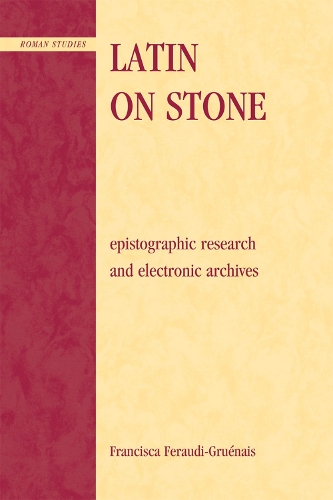
Latin on Stone: Epigraphic Research and Electronic Archives
(Hardback)
Publishing Details
Latin on Stone: Epigraphic Research and Electronic Archives
By (Author) Francisca Feraudi-Gruenais
Contributions by Sarolta A. Takcs
Contributions by Francisca Feraudi-Grunais
Contributions by William Stenhouse
Contributions by Rebecca R. Benefiel
Contributions by Christian Witschel
Contributions by Gabriel Bodard
Contributions by Silvia Evangelisti
Contributions by Amina Kropp
Bloomsbury Publishing PLC
Lexington Books
20th May 2010
United States
Classifications
Tertiary Education
Non Fiction
930.1028
Physical Properties
Hardback
198
Width 163mm, Height 242mm, Spine 20mm
463g
Description
Latin on Stone brings together epigraphy scholars on both sides of the Atlantic, highlighting both their research in the field of ancient Latin inscriptions and the electronic technology of which they make use. These interdisciplinary essays reflect a contemporary reality, in which the possibilities and necessities of using modern electronic aids for research on ancient inscriptions can produce very differing results. Databases are an ideal means of making primary sources accessible and allowing scholars to draw well-founded conclusions in a short space of time, but their usefulness depends, of course, on the quality and accuracy of the data entered into them. The trend towards cooperation has been increasingly evident, in Latin epigraphy at least, over the last few years. Alongside these complex synergies, on the rise are interdisciplinary associations based on web-based data transfer. All of the new visions and achievements discussed in the volume can only be fully realized, however, if the traditional roots of epigraphy are maintained. Rather than being blinded by a sort of "electronic madness," scholars must recall the rich heritage of epigraphic transmission as a source of information that has yet to be exhausted. This volume is not only a plea for an increased use of modern (electronic) technology but also a warning against putting trust solely in such technology. It should come as no surprise, given the continuing process of globalization, that the contributors are drawn from both Europe and America. Each scholar is engaged in an attempt not only to scrutinize epigraphic culture afresh, but also to search for common denominators among such a variety of material. Their efforts will increase the diversity of the cross-linking of, and the search possibilities in, the data provided by epigraphic source material. It is a matter of strengthening, increasing, and contextualizing both the epigraphic sources and the data decoded from them.
Reviews
The aim of this edited collection is to showcase the research possibilities inherent in the application of digital technology, notably electronic databases, to the study of Latin inscriptions. The editor, Francisca Feraudi-Gruenais, head researcher at the Heidelberg Epigraphic Database, is admirably positioned to undertake such a task, and she has invited contributions from scholars in Europe and North America who are using this technology to ask new and interesting questions of the epigraphic material. * Bryn Mawr Classical Review *
Author Bio
Francisca Feraudi-Grunais is head researcher at the Epigraphic Database Heidelberg.
